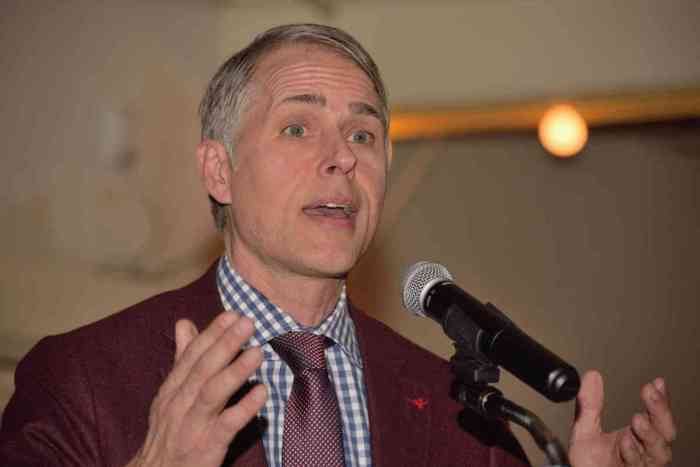Mayor Bill de Blasio presented his preliminary budget for the fiscal year beginning July 1 at a City Hall event on February 1. | DUNCAN OSBORNE
While Mayor Bill de Blasio is proposing to increase spending by roughly $2 billion in the city fiscal year that begins on July 1, cuts in federal and state support for the city may force the mayor to curtail those plans.
“This budget proceeds against a backdrop of tremendous uncertainty,” the mayor said during a February 1 presentation of the city’s 2019 preliminary budget at City Hall.
The proposed budget will spend $88.67 billion, up from the preliminary budget presented last year of just $86 billion. The mayor said the new spending was paid for with savings worth $900 million by city agencies in the current and coming fiscal years, reduced healthcare costs of $1.3 billion for city employees in both fiscal years, and $300 million in savings in both fiscal years resulting from a “partial hiring freeze.” The city also recouped just over a $1 billion in taxes from audits, de Blasio said.
De Blasio lays out $88.57 billion plan, but warns of huge unknowns regarding federal, state funding
The new spending will upgrade infrastructure in some of the city’s public housing, expand the signature mayoral Pre-K and now 3-K programs, and fund additional efforts that de Blasio has championed since taking office four years ago.
While the city’s tax base has swelled and the city is expecting to collect $27.6 billion in property taxes in the 2019 fiscal year, it relies on state and federal dollars to pay for roughly a quarter of city spending. In some city agencies, federal or state dollars fund nearly half of their budget and nearly all of certain programs.
In his proposed budget for the state fiscal year that begins on April 1, Governor Andrew Cuomo proposed cutting state aid to the city or shifted costs of programs to the city by $400 million. State dollars could be reduced by as much as $700 million, according to the preliminary budget.
While the city is claiming that as much as $700 million in federal dollars are at risk in the 2019 city budget, it is not at all clear how the city knows that. Republicans have been in charge of the White House and Congress for over a year and have yet to produce a budget for the current federal fiscal year, which began on October 1 of last year. Since September of last year, Republicans have used a series of continuing resolutions to fund federal spending with the latest set to expire on February 8.
Other federal actions could also threaten the city budget.
The federal tax reform law, which was signed into law in late December, allows taxpayers to deduct only the first $10,000 in state and local taxes on their federal returns. That could prompt some of the wealthiest New York taxpayers, who pay a large portion of city and state income taxes, to leave for lower tax states.
“The federal tax bill has made things worse all around,” the mayor said. “Fundamentally broken policy and mistaken policy have very negative ramifications for the country and for the city before you even talk about what it means for the individual taxpayer or homeowner.”
That law will add at least $1.4 trillion to the federal deficit over 10 years and that could prompt Republicans, who have long wanted to attack Medicaid, Medicare, and Social Security, to take a budget axe to those entitlement programs. That could impact city agencies — such as NYC Health + Hospitals, which operates the city’s 11 hospitals and other facilities — that rely on Medicaid funding.
All of the budget concerns have implications for non-profit organizations that serve the LGBTQ community and rely on Medicaid or contracts funded, directly and indirectly, with city, state, or federal dollars.
“I think we can safely say we’ve never seen anything like this before,” de Blasio said. “There’s a lot we are worried about.”
Corey Johnson, the new speaker of the City Council, spoke with reporters prior to the mayor’s presentation and voiced similar concerns.
“There are a lot of questions about loss of money from Albany, loss of money from Washington,” he said.


































